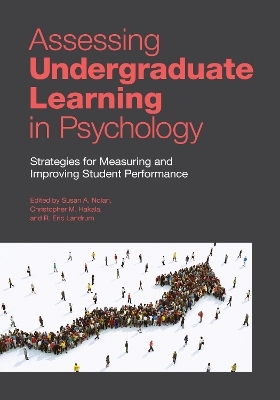
Assessing Undergraduate Learning in Psychology
American Psychological Association (Verlag)
978-1-4338-3227-7 (ISBN)
This book shows educators how to develop assessments for designing pedagogies, courses, and curricula around student learning goals, including those identified by APA’s Guidelines for the Undergraduate Psychology Major.
The contributors are veteran educators who offer expert advice for addressing assessment‑driven pressures from individual and institutional stakeholders. They also discuss international pressures as education programs around the world become more interconnected, which requires global cooperation and harmonization.
Using illustrative case examples, the authors provide strategies for assessing students’ learning, developing institutional assessment plans, and building bridges across institutions and international borders. In addition, they highlight the limitations of assessment, encouraging flexibility in determining what to assess and how to act on and communicate the resulting data. They encourage active, thoughtful engagement to improve student learning, and ensure that today’s students are ready to compete in the global economy.
Susan A. Nolan, PhD, is a psychology professor at Seton Hall University, New Jersey. She has taught numerous courses, including Abnormal Psychology, International Psychology, Introduction to Psychology, and Statistics. She has also coauthored several statistics and introduction to psychology textbooks. Dr. Nolan served as a United Nations representative for the American Psychological Association and researched international psychology education in Bosnia and Herzegovina as a U.S. Fulbright Scholar. She also studies the education and careers of women and men in science, technology, engineering, and mathematics (STEM) fields. Susan Nolan lives in Jersey City, New Jersey. Follow @susan_a_nolan on Twitter. Christopher M. Hakala, PhD, is a psychology professor and the director of the Center for Excellence in Teaching, Learning, and Scholarship at Springfield College, Massachusetts. His research has focused on reading comprehension, teaching and learning, effective faculty development and assessment, and best practices in the classroom. Dr. Hakala has been invited to present at many conferences around the country as well as dozens of colleges and universities on topics ranging from reading narrative text to managing large classes and engaging students in ways that maximize their learning. He lives in Wilbraham, Massachusetts. Follow @chakala5 and @CenterTeaching on Twitter. R. Eric Landrum, PhD, is a professor and chair of the Department of Psychological Science at Boise State University, Idaho. He teaches courses including Introductory General Psychology, Introduction to the Psychology Major, Statistical Methods, Research Methods, and Psychological Measurements. Dr. Landrum’s research interests center on educational issues and facilitating student success. He is the author of Undergraduate Writing in Psychology (3rd ed.) (2021) and has won multiple teaching awards, including the American Psychological Foundation’s Charles L. Brewer Distinguished Teaching of Psychology award in 2019. Eric Landrum lives in Meridian, Idaho. Visit https://ericlandrum.com/ and follow @ericlandrum on Twitter.
Contributors
Introduction: Assessment Assessment Everywhere—And What Are We to Think?
Susan A. Nolan, Christopher M. Hakala, and R. Eric Landrum
Part I. Institutional Approaches
Chapter 1. Scholarship of Teaching and Learning and Assessment: Advancing a Collaborative Model
Regan A. R. Gurung
Chapter 2. A Framework for Setting Educational Priorities
Melissa Beers
Chapter 3. The Sound and Fury of Academic Program Reviews: What They Reveal about Assessment and Accountability
Jane S. Halonen and Dana S. Dunn
Chapter 4. Replacing the Term Formative Assessment: A Modest Proposal
Rob McEntarffer
Chapter 5. How to Create a Culture of Assessment
Jason S. Todd and Elizabeth Yost Hammer
Chapter 6. Overcoming Obstacles That Stop Student Learning: The Bottleneck Model of Structural Reform
Claudia J. Stanny
Chapter 7. Backward Design, the Science of Learning, and the Assessment of Student Learning
Catherine E. Overson and Victor A. Benassi
Part II. Individual Approaches
Chapter 8. Assessment as a Pedagogical Science: A Stealthy Approach to Studying Effective Teaching
Bridgette Martin Hard
Chapter 9. Evidence-Based Teaching and Course Design: Using Data to Develop, Implement, and Refine University Courses
Danae L. Hudson
Chapter 10. A Taxonomy for Assessing Educational Change in Psychology
Raymond J. Shaw
Chapter 11. Using Formative Self-Assessment to Improve Teaching and Learning in Educational Psychology Courses
Eva Seifried and Birgit Spinath
Part III. International Approaches
Chapter 12. Assessing Learning Outcomes in Undergraduate Psychology Education: Lessons Learned From Five Countries
Jacquelyn Cranney, Julie A. Hulme, Julia Suleeman, Remo Job, and Dana S. Dunn
Chapter 13. Applying the Assessment Design Decisions Framework Internationally
Jacquelyn Cranney, Dana S. Dunn, and Suzanne C. Baker
Chapter 14. Measuring the Generic Skills of Higher Education Students and Graduates: Implementation of CLA+ International
Doris Zahner, Dirk Van Damme, Roger Benjamin, and Jonathan Lehrfeld
Chapter 15. Interdisciplinary Innovations in Formative and Summative Assessment: The Beliefs, Events, and Values Inventory; VALUE Rubrics; and the Cultural Controllability Scale
Kris Acheson, Ashley Finley, Louis Hickman, Lee Sternberger, and Craig Shealy
Afterword: What’s Next?
Susan A. Nolan, Christopher M. Hakala, and R. Eric Landrum
Index
About the Editors
| Erscheinungsdatum | 01.09.2020 |
|---|---|
| Verlagsort | Washington DC |
| Sprache | englisch |
| Maße | 178 x 254 mm |
| Themenwelt | Geisteswissenschaften ► Psychologie ► Test in der Psychologie |
| Sozialwissenschaften ► Pädagogik | |
| ISBN-10 | 1-4338-3227-5 / 1433832275 |
| ISBN-13 | 978-1-4338-3227-7 / 9781433832277 |
| Zustand | Neuware |
| Haben Sie eine Frage zum Produkt? |
aus dem Bereich


